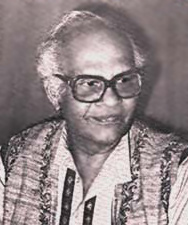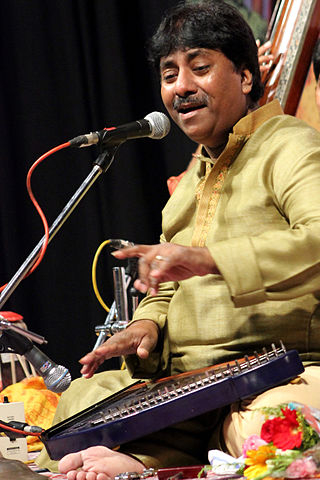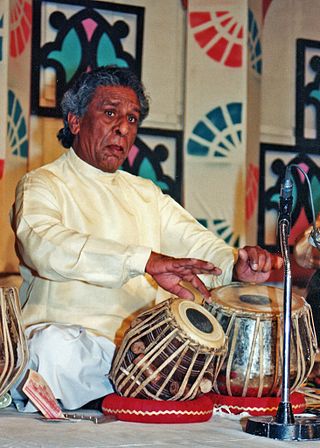Related Research Articles

Ustad Amir Khan was one of the greatest and most influential Indian vocalists in the Hindustani classical tradition. He was the founder of the Indore gharana.

Pandit Taranath Ram Rao Hattiangadi was a performer and teacher of Indian classical percussion, known for his knowledge of rare talas and old compositions. He represented the Farukhabad, Delhi, and Ajrada gharanas of tabla, and the Nana Panse tradition of pakhavaj. He studied formally for 47 years—an exceptional amount of time, even in the Indian master-disciple system—under many pandits and ustads, most notably Shamsuddin Khan. He had numerous disciples and students of special training.

Ustad Rashid Khan is an Indian classical musician in the Hindustani music tradition. He belongs to the Rampur-Sahaswan gharana, and is the great-grandson of gharana founder Inayat Hussain Khan. He is married to Soma Khan.
Ustad Faiyaz Khan was a tabla player of international repute.
Rampur-Sahaswan gharana is a gharana of Hindustani classical music centred in the North-Uttar Pradesh towns of Rampur and Sahaswan. Ustad Inayat Hussain Khan (1849–1919) was the founder of this gharana.

Pandit Nayan Ghosh is an Indian Tabla and Sitar maestro. He is a tabla player from the Farrukhabad Gharana.
Farrukhabad Gharana is one of six prominent playing styles or gharanas of North Indian tabla, in Hindustani classical music, and derives its name from Farrukhabad in Uttar Pradesh state.
Ustad Shafaat Ahmed Khan New Delhi, India, was one of the leading tabla maestros in the field of Hindustani classical music.
Pandit Shankar Ghosh was an Indian tabla player from the Farukhabad gharana of Hindustani classical music. He was an occasional Hindustani classical singer where he followed the Patiala gharana.

Pandit Anindo Chatterjee is an Indian tabla player of the Farukhabad gharana school. He was born into a musical family. Chatterjee is a disciple of Pandit Jnan Prakash Ghosh.

Ghulam Mustafa Khan was an Indian classical musician in the Hindustani classical music tradition, belonging to the Rampur-Sahaswan Gharana.

Anokhelal Mishra — also spelled as Anokhe Lal Misra and commonly known as Pandit Anokhelalji — was an Indian Tablā Artist who belonged to the Banaras Gharana of Hindustani classical music.

Swara Samrat festival is a four-day annual festival of Indian classical music and dance held during the winters in Kolkata, India. This festival is the brainchild of Sarod maestro Pandit Tejendra Narayan Majumdar, his vocalist wife, Manasi Majumder and their Sarod player-son Indrayuddh Majumder. The festival is dedicated to Swara Samrat Ustad Ali Akbar Khan. Indian Classical Music and Dance Legends such as Pandit Shivkumar Sharma, Pandit Birju Maharaj, Pandit Hari Prasad Chaurasia, Pandit Jasraj, Ustad Zakir Hussain, Ustad Aashish Khan, Dr. Girija Devi, Begum Parveen Sultana, Pandit Swapan Chaudhuri, Guru Karaikudi Mani, Ustad Rashid Khan, Shankar Mahadevan, Pandit Budhaditya Mukherjee, Pandit Ulhas Kashalkar, Pandit Venkatesh Kumar, Pandit Ajoy Chakraborty, Pandit Anindo Chatterjee, Pandit Sanjay Mukherjee, Ustad Shahid Parvez, Ustad Shujaat Khan, Pandit Tejendra Narayan Majumdar, Pandit Kushal Das, Pandit Rajendra Gangani, Guru Sujata Mohapatra, Pandit Subhankar Banerjee, Pandit Yogesh Samsi, Pandit Bickram Ghosh, Pandit Tanmoy Bose and Kaushiki Chakraborty are some of the artists who have previously performed in this festival.
Ustad Moinuddin Khan was a veteran Indian classical instrumentalist and vocalist, who played sarangi. Based in Jaipur, he belonged to the "Jaipur Gharana" of Hindustani classical music. Khan has performed his music for All India Radio, Jaipur, in solo programmes. In 2014, the Government of India conferred upon him its fourth-highest civilian award the Padma Shri. Ustad Moinuddin Khan and his family have been carrying this tradition for generations with his son, Shri Momin Khan being the 8th generation to play Sarangi at the highest level and touring the world.
Pandit Nikhil Jyoti Ghosh was an Indian musician, teacher and writer, known for his proficiency in the percussion instrument of tabla. He founded Sangit Mahabharati, an institution of music in 1956, and performed on various stages in India and abroad. A recipient of the Ustad Hafiz Ali Khan Award, his style was known to have been aligned with the Delhi, Ajrada, Farukhabad, Lucknow and Punjab gharanas of music. The Government of India awarded him the third highest civilian honour of the Padma Bhushan, in 1990, for his contributions to Music.

Mian Shaukat Hussain was a Pakistani tabla player who belonged to the Punjab gharana of tabla-playing music artists.
Dhruba Ghosh was an Indian classical musician and Sarangi player from Mumbai.

Ishaan Ghosh is the son and disciple of the Tabla and Sitar maestro Pandit Nayan Ghosh. Ishaan is a Tabla player from the Farrukhabad Gharana.
Rashid Mustafa is a Tabla player empanelled in the Indian Council for Cultural Relations in 2010 under the category Tabla for Hindustani classical music. Mustafa was awarded the Thirakwa Award by Bharatiya Vidya Bhavan in 1984 and also received the Crystal Award from Yehudi Menuhin in Davos, Switzerland.
Pandit Suresh "Bhai" Gaitonde was an Indian tabla player. He is best known for being a major disciple of Ahmed Jan Thirakwa and leading representative of the Farukhabad tradition. He was the leading exponent of Thirakwa Shailey (baaj). Sangeet Natak Academy has stored his recording in the archives as the successor of Ustad Thirakwa.
References
- 1 2 3 4 5 Vithal C. Nadkarni (25 December 2016). "Partnership in percussion' and profile of Ahmed Jan Thirakwa". The Hindu (newspaper). Retrieved 10 July 2020.
- ↑ "Artistesdetails". underscorerecords.com. Retrieved 12 July 2020.
- 1 2 3 4 Anjana Rajan (8 January 2015). "Home is where the art is: Tabla exponent Rashid Mustafa Thirakwa speaks about the festival in memory of his guru, Ustad Ahmed Jan Thirakwa". The Hindu (newspaper). Retrieved 11 July 2020.
- 1 2 3 Profile of Ahmed Jan Thirakwa on chandrakantha.com website Retrieved 12 July 2020
- 1 2 3 "Profile of tabla player Nikhil Ghosh, a disciple of Ahmed Jan Tirakhwa". Sangit Mahabharati website. 2016. Retrieved 12 July 2020.
- ↑ "Sangeet Natak Akademi Award in 1954 for Ahmed Jan Thirakwa". Sangeetnatak.com website. 16 August 2007. Archived from the original on 19 May 2009. Retrieved 11 July 2020.
- ↑ Profile of Ahmed Jan Thirakwa on kamat.com website, Retrieved 10 July 2020